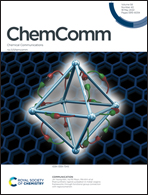Auto-cycling primer extension for amplified microRNA detection†
Abstract
The current polymerase-based nucleic acid amplification techniques cannot maintain continuous polymerization reactions unless by changing the temperature or adding additional reagents (e.g. the second enzyme or betaine), which undoubtedly increases the cost and operation steps. Herein, a new isothermal nucleic acid amplification technique, termed auto-cycling primer extension (APE), is presented. It repeatedly extends short DNA primers to longer DNA hairpins, by combining a DNA-based copy-and-release hairpin (CRH) and palindromic sequence design. The experimental results showed that we could realize the amplification detection of miRNA by a reasonable probe design.



 Please wait while we load your content...
Please wait while we load your content...